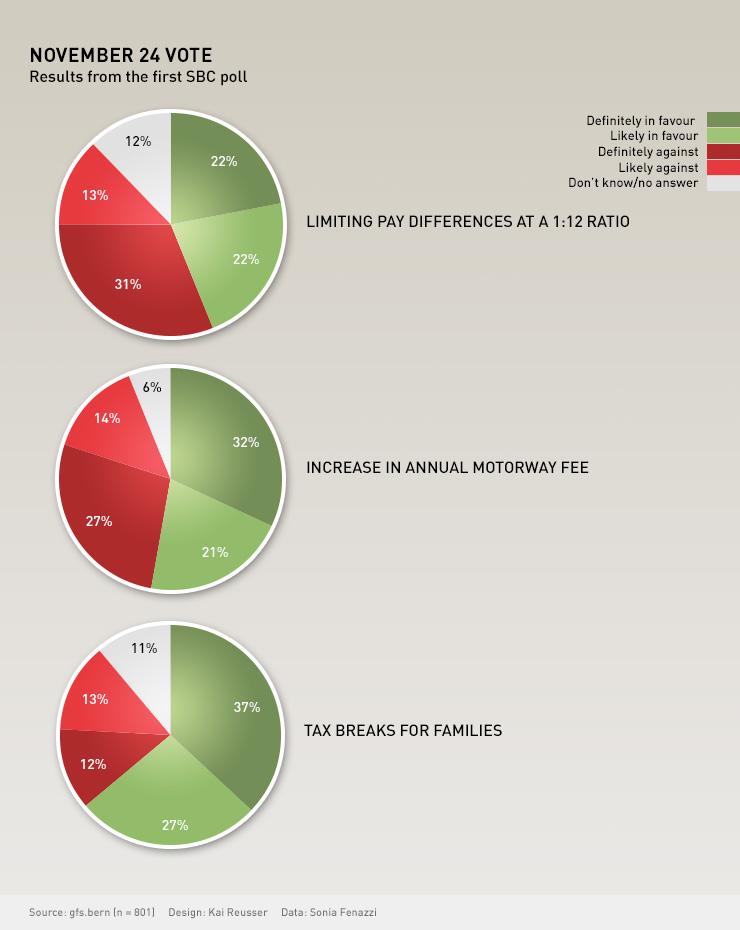
Public support for 1:12 pay cap appears to wane

An initiative to limit the amount of money companies pay their managers is likely to be rejected at the ballot box next month.
An opinion poll published on Friday shows supporters and opponents neck and neck but the naysayers are expected to gain ground in the weeks leading up to the vote on November 24.
The survey by the leading GfS Bern research institute found 44% of respondents saying they would approve the proposal to limit manager pay to no more than 12 times the salary of the lowest-paid employee. An equal number of respondents said they would reject it. (For details see graphic.)
Based on previous polls, opponents are likely to gain further ground at the expense of supporters, according to head pollster, political scientist Claude Longchamp.
“The early start of the campaign by supporters gives opponents more time to catch up and win voters over,” he says.
The Young Socialists had launched their public drive as early as March with a clear message appealing to social justice and they clearly held the upper hand for several months.
Doing so the promoters rode on a wave of public anger against excessive manager salaries, notably the ballot box success of an earlier initiative about the same issue by an independent businessman and senator, Thomas Minder.
His proposal to give shareholders of listed companies a greater say in pay packages of top executives and board members won nearly 68% of the vote.

More
Poll results
Differences
However, Longchamp does not believe another upset is likely in November. Although both initiatives have similar goals, they have different ideological backgrounds.
“The hardcore opponents of both initiatives are the same, but the supporters of the 1:12 initiative are split,” he says.
Unlike the March ballot, the poll said that voters above the age of 65 don’t agree with the proposal by the youth chapter of the Social Democrats.
Opposition also appears to be greater in the majority German-speaking part of the country than in the French and Italian language regions.
Most political parties, parliament, the cabinet and the business community argue that the rules imposed on employers and employees by the initiative would be too strict.
The pollsters interviewed 1,215 citizens from across the country for the first of two surveys ahead of the November 24 vote.
Swiss expatriates are not included in the poll.
The telephone interviews took place between October 7 to October 12.
The margin of error is 2.9%.
The survey was commissioned by the Swiss Broadcasting Corporation, swissinfo’s parent company, and carried out by the leading GfS Bern research and polling institute.
Tax breaks for families
On November 24, voters will also be asked to decide on the latest initiative aimed at easing the tax burden on families. Put forward by the rightwing Swiss People’s Party, the proposal – if accepted – would give breaks to families who do not use daycare facilities.
Nearly two out of three respondents in the survey came out in favour of the idea. However, GfS Bern is wary of forecasting a win for the People’s Party.
“The opponents’ campaign has only just begun. So far there has been no broad debate,” says GfS political scientist Martina Imfeld.
Nevertheless, Imfeld acknowledges that a 40% lead for supporters is exceptionally high at this stage of the campaign.
“The outcome is hard to predict as most citizens have not yet made up their minds,” she adds.
Most political parties, the cantons, the business community and the cabinet argue approval of the proposal would lead to an important drop in tax revenue.
Car owners
A third issue to be decided at the ballot box in November is a planned increase in the annual fee for the Swiss motorway network.
Parliament in March agreed to raise the price for a mandatory sticker, also known as a vignette, from CHF40 ($43.80) to CHF100 per year.
However, a cross-party committee supported by motorist associations collected enough signatures to challenge the decision to a referendum.
“It is an issue that is particularly close to the heart of many citizens. A high turnout in November could benefit the opponents,” says Longchamp.
Supporters at the moment have a 12% lead over the opponents.
About 47% of the electorate say they will take part in the ballot – a level slightly above the long-term average in nationwide votes.
A second and final poll is due ten days ahead of voting day.

In compliance with the JTI standards
More: SWI swissinfo.ch certified by the Journalism Trust Initiative
















![The four-metre-long painting "Sonntag der Bergbauern" [Sunday of the Mountain Farmers, 1923-24/26] had to be removed by a crane from the German Chancellery in Berlin for the exhibition in Bern.](https://www.swissinfo.ch/content/wp-content/uploads/sites/13/2025/12/01_Pressebild_KirchnerxKirchner.jpg?ver=bb19e376)















You can find an overview of ongoing debates with our journalists here . Please join us!
If you want to start a conversation about a topic raised in this article or want to report factual errors, email us at english@swissinfo.ch.